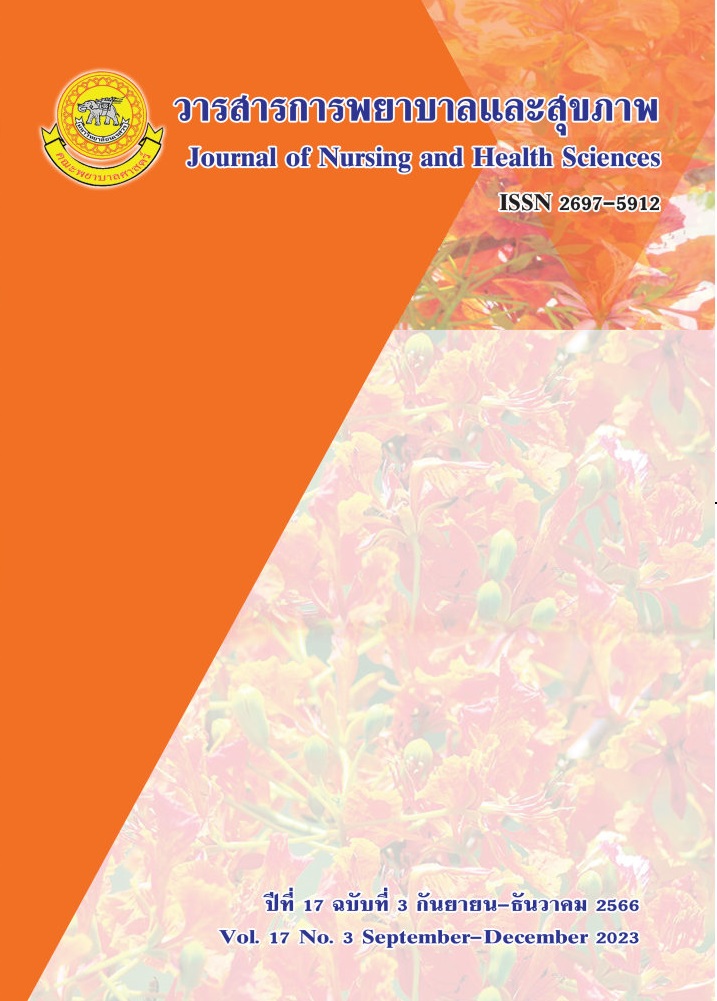The Effects of Self-efficacy Enhancement Program on Stroke Prevention Behavior and Blood Pressure among Patients with Hypertension
Main Article Content
Abstract
The purpose of this quasi-experimental research was to study the effects of self-efficacy enhancement program on stroke prevention behavior and blood pressure among patients with hypertension. Sample were 64 patients with hypertension, who received medical treatments from the sub-district health-promoting hospital in Nakhon Panom province. The sample were assigned into the control and experimental groups, which included 32 patients in each group. The control group received routine nursing care, whereas the experimental group received self-efficacy enhancement promotion program for 8 weeks. The instrument was the Self-efficacy enhancement program among patients with hypertension. Data were collected by using the self-efficacy enhancement and stroke prevention behavior of hypertension patient questionnaire. This research tool had the Cronbach’s alpha coefficient of 0.87 and 0.80. Sphygmomanometer were tested for their biometric property. Data were analyzed by using the descriptive statistics, Chi-Square test, Paired t-test , and Independent t-test. The results revealed that mean scores of self-efficacy enhancement and stroke prevention behavior of experimental group after receiving an intervention were higher than those of before receiving and higher than the control group (p < .001) and mean systolic blood pressure and diastolic blood pressure after experiment were lower than before experiment and lower than the control group (p < .001). Therefore, the Self-efficacy enhancement promotion program can change health behaviors and reduce blood pressure levels of patients with hypertension and can be further applied to promote self-care in the patients with hypertension.
Article Details

This work is licensed under a Creative Commons Attribution-NonCommercial-NoDerivatives 4.0 International License.
References
Bandura, A. (1977). Self-efficacy :Towerd a unifying theory of behavioral chang. Psychological Review, 84, 191-125.
Bandura, A. (1997). Self-Efficacy: The Exercise of Control.New York: W. H. Freeman and Company.
Bunchuai U. (2017). The Effects of Health Promotion Program for Hypertension, Hypertension Elderly Case Study: Thri tong Tumbon Health Promotion Hospital Chai Buree District, Surat thani Province.Journal of Community Health Development Quarterly Khon Kaen University, 3(2), 231-244.[In Thai].
Chala-em T. (2018 ). Effects of Physical Activity Promotion Program in Elderly People with Hypertension:A Case Study of the KaeNok Temple Community Health Center, Bangasor Sub-district, Muang District, Nonthaburi Province. Journal of Nursing
and Education,11(4), 107-125. [In Thai].
Chirawatkul A. (2008). Statistics for health science research. (4thed.). Khon Kaen: Klungnana Vitthaya Press. [In Thai].
Cohen J. (1988). Statistical power analysis for the behavior sciences (2nd ed.).Hillsdale NJ: Lawrence Erlbaum.
Department of Disease Control. (2017). CVD Risk Assessment in Diabetic and Hypertension Patients.Bangkok: Bureau of Non-Communicable Disease.[In Thai].
Department of Disease Control. (2015). Guidelines of Cardiovascular Disease Risk Assessment.Bangkok: Bureau of Non-Communicable Disease.[In Thai].
Division of Non communicable Diseases.(2019. Number and mortality rate of stroke.Retrieved 1 April 2022 ,from http://www.thaincd.com/2016/mission/documents-detail.php?id=13893&tid=32&gid=1-020 . [In Thai].
Health Data Center. (2022). Stroke prevalence rate A. D.2020-2022. Retrieved16 October 2021, from https://hdcservice.moph.go.th/hdc/main/index.php.[In Thai].
Hoikum A., Piyabanditkul L., & Kittipichai W. (2020).Factors predicting the occurrence of stroke in hypertensive patients in Khon Kaen province.Journal of Health Science research, 20(2), 82-92.[In Thai].
Khumros W., & Ekpreechakul T,(2019). Cerebrovascular disease, risk factors, and quality of life: A systematic review. Chula Med Bull, 1(5), 473-487. [In Thai].
Nilnate N. (2019). Risk Factors and Prevention of Stroke in Hypertensive Patients. Journal of The Royal Thai Army Nurses, 20(2), 51-57. [In Thai].
Praklantung sub-district health-promoting hospital.(2021). Annual report 2021. [place unknown];2021. [In Thai].
Saguansuk P., & Mekrungrongwong S. (2022).The Effectiveness of a Self-efficacy Building Program on Stroke Prevention Behaviors among Elderly Patients with Chronic illness in Khlong Khlung District, Kampaengphet Province.The Southern College Network Journal of Nursing and Public Health, 9(2), 122-135. [In Thai].
Siriyong W. (2018). Prevalence of Stroke and Stroke Risk Factors in Kanchanadit Hospital. Region 11 Medical Journal, 32(1), 863-870. [In Thai].
Soontharak O. (2018). A study of risk factors for stroke among people in Nakhon Phanom province. NAKHONPANOM HOSPITAL JOURNAL, 5(2),27-38. [In Thai].
Supasri S., Wungrath J., & Boonchieng W. (2021). Effects of a Health Promotion Program on Perceived Self-Efficacy and Outcome Expectations on Self-Care among Elderly with Hypertension,Chiang Rai Province, Thailand. Thai Journal of Public Health, 51(1); 33-42. [In Thai].
World Stroke Organization. (2020). Annual Report 2020.Retrieved 1 April 2022 from https://www.worldstroke.org/assets/downloads/WSO_Annual_Report_2020_online.pdf.
Wutthitham N., Chontong R., & Sompradit CH. (2020).The effects of Self-efficacy Enhancement on Blood Pressure Level Controlled among Hypertension Risk Group, Journal of The Royal Thai Army Nurses, 21(1), 309-318. [In Thai].


